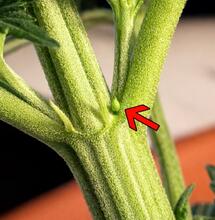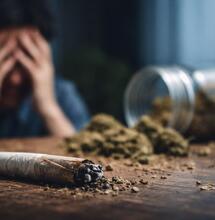Cannabis Might Cause Poorer Sleep and Memory Function

Cannabis can help facilitate better sleep, and certain cannabinoids can work particularly well for memory. But habitual use of cannabis, in some cases, could actually mean poorer sleep and difficulties with visual memory. At least that’s the conclusion from a recent study where scientists assessed the effects of cannabis on sleep and memory. Learn more about when and how cannabis users could experience poorer sleep and memory problems.
Cannabis might cause poorer sleep and issues with memory, according to a study published in The American Journal of Drug and Alcohol Abuse. The study looked at the role of sleep in the link between cannabis use and memory function.
A total of 141 adults with cannabis use disorder (CUD) and 87 non-current users were recruited to be part of this research effort. Participants hailed from two locations: Dallas, Texas and Amsterdam, the Netherlands. For the purposes of the study, CUD was defined as regular use of cannabis, or smoking at least 5 days a week during the past year. All participants were between 18 and 30 years old.
Study Participants Self-Reported on Sleep Problems Frequency
The cross-sectional study asked participants to self-report on any issue with sleep they faced during the trial. In addition, they completed different cognitive tests for verbal memory, visuospatial learning, and memory performance.
Participants with CUD were asked to stop cannabis use 24 hours before their test appointments, in order to avoid the effects of acute intoxication.
Results showed that the CUD group reported more sleep problems than the control group, and that was correlated to visuospatial memory difficulty as well. Visuospatial working memory concerns recalling or using images to stay oriented in space or keep up with the location of moving objects. On the other hand, the tests showed no difference in verbal memory performance between the two groups.
“Although sleep is one of the primary reasons people use cannabis, our findings suggest that long-term cannabis use actually results in poorer sleep, which is associated with poorer memory,” said lead study author Tracy Brown, a UT Dallas psychology PhD student.
“These findings are useful to inform the consumers, clinicians and policymakers about the therapeutic considerations for cannabis, particularly its use as a sleep aid,” Brown said.
Nothing is determinative with this study, however. Its authors noted that more research is indeed needed on this topic. Research that will take into consideration CUD in future assessments of the relation between cannabis, sleep quality, and memory function.
Sleep problems were still sized up in a generalized context, the study authors wrote, adding that it’s possible the participants viewed some of the questions as pertaining to cannabis withdrawal.
How Cannabis Can Affect Sleep?
For a good night’s sleep, a person needs to get enough hours of both REM sleep and deep sleep. REM is the phase associated with more dreams and body movement, while deep sleep is the more restful part of the sleep cycle. Both phases are important for a healthy function of the human body.
What cannabis does to users is, it reduces the amount of REM sleep. This could be a good thing for anyone suffering bad dreams that wake you up at night, especially during stressful periods. It’s also good news for PTSD patients, who often suffer from dream-disturbed sleep related to past trauma. Still, chronic cannabis use could disrupt sleep in the later part of the night, which in turn may affect cognitive function the next day.
It’s also important how and when cannabis was used before going to bed. Potent cookies or candy might take time to work around the body and may not be a smart choice on evenings when you aim for a good, long sleep. Same might be true with significantly potent strains that may stimulate the central nervous system more than calming it down.
But every person is different. Therefore, everyone would react differently or would require different doses or products to get the most of cannabis effects, including its ability to facilitate deep sleep. Taking a break from cannabis when you feel it’s doing you more harm than benefit could be a wise decision. It might be after taking such breaks that you establish better habits of how to use this natural medicine and avoid making tolerance or experiencing side effects such as poor sleep.
More on this topic from Soft Secrets:
- What Are All the Effects of Cannabis on Your Sleep?












